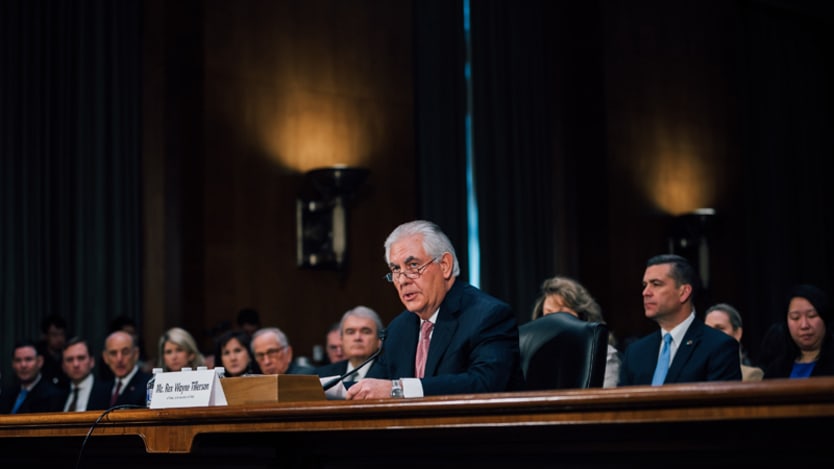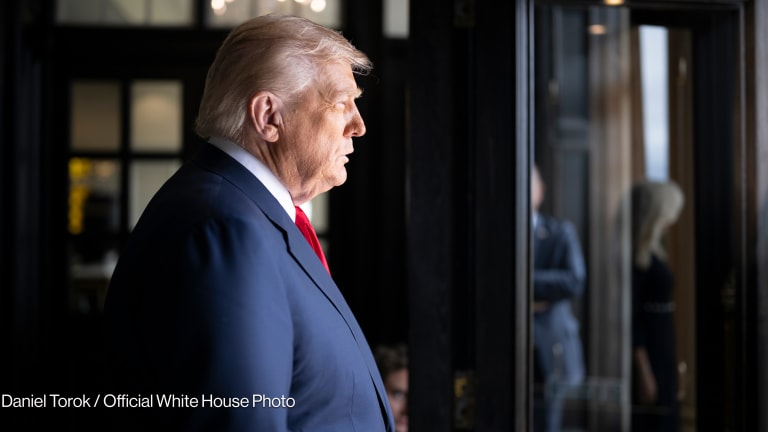
Senators dismissed United States President Donald Trump’s proposed cuts to foreign assistance in two hearings on Tuesday, with members from both parties promising to not use the White House proposals as a guide in 2018 appropriations for aid.
Members of both the Senate Committee on Foreign Relations and the Senate appropriations Subcommittee on State, Foreign Operations made it clear that the budget Congress puts forward is likely to look quite different from the administration’s proposals.
“The budget that’s been presented is not going to be the budget that we’re going to deal with,” said Senate Committee on Foreign Relations Chairman Sen. Bob Corker, a Republican from Tennessee at the hearing. “What comes out of Congress will not resemble what is presented today, so it would be a waste of time to go through it because it’s not what is going to occur.”
U.S. Secretary of State Rex Tillerson testified at both hearings, which centered around the president’s budget request for the State Department. The hearings are being highly watched by diplomats and aid professionals as an indicator of if and where they should brace for dramatic budget cuts.
“I want the country to know that this budget request is radical and reckless when it comes to soft power.”
— Republican Senator Lindsey GrahamIn addition to topline funding, the hearings also discussed ongoing reorganization efforts at the State Department and major global humanitarian crises. Other issues that made their way into discussion included the so-called “global gag rule,” Power Africa, democracy and human rights, human trafficking and the McGovern-Dole school feeding program.
Tillerson testified that, despite any loss of funds, the U.S. will “continue to be the leader in international development, global health, democracy and good governance initiatives, and humanitarian efforts,” he told the foreign relations committee.
Senators, however, questioned that notion, picking apart numerous cuts and asking how cuts would allow the U.S. to maintain its leadership on issues ranging from global health to humanitarian assistance to democracy and human rights.
Just the proposal itself had had a “chilling impact” on staff and sent the wrong message about U.S. leadership, said Sen. Ben Cardin, a Democrat from Maryland, who promised congress will write its own budget that will likely not be “remotely” close to the proposal.
“I am deeply concerned that your administration's approach does not place America first but rather leaves America alone,” Cardin said. He called the cuts “a devastating assault on America's interests and values.”
Opening the debate
In his prepared testimony, Tillerson presented the administration’s budget request as a national security-minded document that included “hard choices to reduce funding” for a number of initiatives through the State Department and U.S. Agency for International Development.
The White House has proposed slashing nearly 30 percent of funding for the two, including eliminating a number of aid initiatives, as Devex has reported.
“Throughout my career, I have never believed, or experienced, that the level of funding devoted to a goal is the most important factor in achieving it,” Tillerson said. “Our budget will never determine our ability to be effective — our people will.”
Stay up to date on Devex coverage of U.S. foreign policy under Trump:
► Mapping Republican views on aid as budget discussions kick off in Congress
▶ Trump budget thrusts US foreign aid into a political fight
▶ What Trump's budget request says about US aid
▶ As budget negotiations begin, here's where US Congress stands on foreign aid
That argument faced the strongest assault from Sen. Lindsey Graham, a Republican from South Carolina, who chairs the Senate appropriations subcommittee on state and foreign operations. Rather than offering the typical brief opening remarks, he gave a nearly 15-minute presentation, complete with numerous graphs and quotes mounted on poster boards that picked apart the cuts proposed by the administration.
“I want the country to know that this budget request is radical and reckless when it comes to soft power,” Graham said. “This account is hit hard not as a result of scrutiny about how the state department works but budget pressure.”
Graham said soft power was “just as important as any military power we have,” and pointed out that the U.S. spends about 1.4 percent on soft power, compared to about 20 percent on hard power. Graham argued that American soft power may not withstand a nearly 30 percent cut.
Graham said he agrees with “threat-based budgeting” but that today’s threats don’t justify a dramatic reduction, that he saw was a “number picked from air.”
Reorganization
Tillerson did not address lingering questions about whether current reorganization efforts at the State Department might lead to a recommendation that USAID be merged into the department.
He did offer details, however, about the internal review process. The State Department recently completed what he called “a listening effort” which included more than 35,000 surveys from State and USAID employees, and in-person “listening sessions” with about 300 people about their experiences with how things work.
Tillerson and other State Department officials are now analyzing the feedback, and expect to release the findings of the survey soon, perhaps in July. Tillerson will take that information and work to address challenges and see how to “produce a more efficient and effective State Department and USAID,” he said. The goal is for plans to be completed by the end of the year and for implementation to start in 2018.
Some of the themes that emerged from the surveys, he said, included: Staff dedication, a need to clarify mixed messages from parts of the State Department, streamlined processes and accountability for poor performers.
Both Sen. Cardin and Sen. Johnny Isakson, a Republican from Georgia, asked Tillerson about the budget proposal’s call to eliminate development assistance and create a new, merged account under the purview of the State Department called the Economic Support and Development Fund.
Isakson questioned the authorization for such a move and said that it went beyond budgeting and toward a restructuring of aid.
Tillerson replied that the agency would likely redesign a number of bureaus and look for overlapping missions and agencies to see where the State Department could work more effectively.
Cardin urged him to work with Congress on the issues of reforms and restructuring the State Department and USAID, to which Tillerson responded that they want everyone on the train. Senators at the hearing appeared to broadly welcome discussing reforms that improve efficiency and effectiveness at the State Department and USAID.
Humanitarian assistance
Ongoing global crises also figured into conversations, particularly famine relief, which recently saw a funding boost from Congress.
Sen. Todd Young, a Republican from Indiana, pressed Tillerson on what the State Department was doing to try to address some of the political obstacles that are preventing the delivery of food and medicines in areas of conflict and areas that are on the brink of famine.
In Yemen, where Tillerson lived for about two and a half years, he said that the State Department are working with a number of different actors to try to find a political solution, though many of the details are not public. Of key concern is the port of Hodeida, where the majority of food and supplies are delivered. Tillerson said they are working to put in place an agreement whereby a third party, perhaps the United Nations, would be given control of the port. Yet even if the U.S. can get food in, he said more work is needed to ensure it is reaching the people who need it.
Some of the challenges in delivering aid may mean an unusually high carryover of funds into the 2018 budget, and there were concerns that the money wouldn’t be obligated. Tillerson was also challenged about the U.S. refusing to accept refugees while decreasing support from Syria’s neighboring countries, such as Jordan, which are taking on more of the burden.
Tillerson said that the U.S. will focus on defeating the Islamic State group, and try to address the underlying reasons that cause people to become refugees or cause famine and will focus on supporting them in places close to their country of origin so that they someday return home.
While the U.S. steps back funding, he said the government is “attempting to marshal the forces of others,” to step in to help meet needs.
Stay tuned to Devex for more news and analysis of what the Trump administration means for global development. Read more coverage here and subscribe to The Development Newswire.








